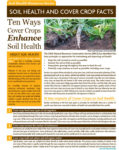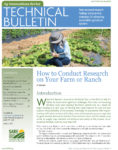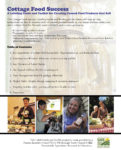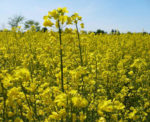Showing 41-50 of 175 results

10 Ways Cover Crops Enhance Soil Health
Soil health is a hot topic these days, one that is justifiably receiving considerable attention from farmers and their farm advisors. This short fact sheet highlights some of the key ways that cover crops improve soil health by influencing the biological and physical characteristics of the soil.

Bringing Independent Farmers into the Marketplace
Small- and mid-sized farms are increasingly turning to supermarkets as a means to earn more for their products and to participate in local economies. In this video, Diana Endicott discusses how she decided to take this route 15 years ago when it was less typical, and how her efforts have resulted in a 100-member co-op today that sells to 30 stores in the Kansas City area.

Investing in the Future of Agriculture: How SARE Supports Farmer-Driven Sustainability
The most pressing challenges that face U.S. agriculture today require science-based solutions developed by partnerships of farmers, ranchers, researchers and educators. Discover how the SARE program enables such partnerships to flourish and meet the needs of agricultural communities across the country.

Our Farms, Our Future Podcast Series
The Our Farms, Our Future podcast series brings together the sustainable agriculture community for thought-provoking conversations about the state of agriculture, how we got here, and where we're headed.

How to Conduct Research on Your Farm or Ranch
This 32-page bulletin outlines how to conduct research at the farm level, offering practical tips for both crop and livestock producers, as well as a comprehensive list of more in-depth resources.

Cottage Food Success: A Labeling Guide and Toolkit for Creating Canned Food Products that Sell
Ideas and step-by-step instructions to increase sales of canned products made in your home kitchen under your state’s cottage food law.

SARE Brochure
A free-to-order catalog/brochure that includes information about SARE, our grant programs, and our printed and online resources.

Sustainable Production and Use of On-Farm Energy
Using solar or wind energy or producing biofuels from crop feedstocks and anaerobic digestion helps farmers achieve energy independence while improving profitability and reducing fossil fuel emissions.

2017 National Conference on Cover Crops and Soil Health
Session recordings are available from the second National Conference on Cover Crops and Soil Health. The event served as an opportunity to learn recent developments in how cover crops are being used by innovative farmers across the country and gain important insights on improving soil health from producers, conservation leaders and scientists. It was held December 7-8, 2017 in Indianapolis.

Recordings of General Sessions
Opening remarks by Jane Hardisty (USDA-NRCS Indiana) with video message Bill Northey (Iowa Secretary of Agriculture) Keynote: Growing a Revolution - Bringing Our Soil Back to Life, by David Montgomery (University of Washington) Farmer panel: Experiences with Cover Crops and Soil Health, with Dan DeSutter (Ind.), Trey Hill (Md.) and Jimmy Emmons (Okla.) Top 10 Ways Cover Crops Build Soil Health, by Rob Myers (North Central SARE) Plenary session: Carbonomics, by Keith Berns (Neb. farmer and Green Cover Seed)